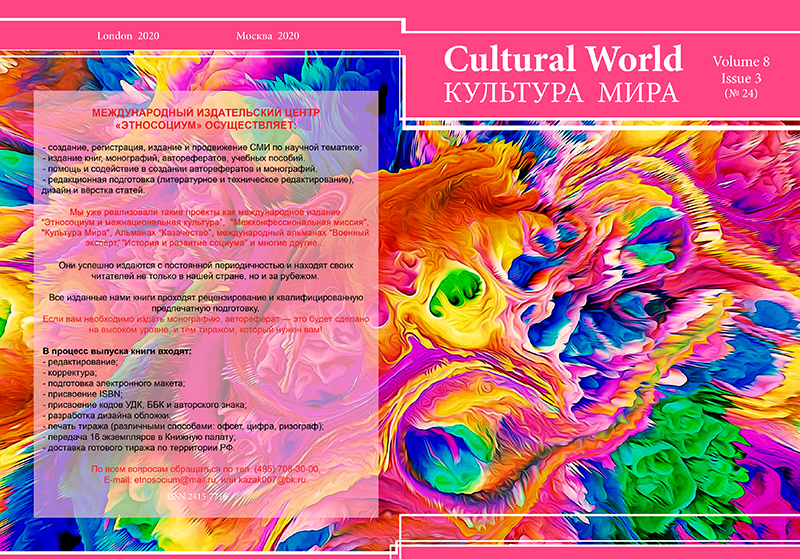
Volume 8. Issue 3. (№ 24)
The Council of Reviewers of the publishing house together with the teaching staff of leading universities:
The main criteria of our choosing materials for publishing is their high scientific level. The main principle of the publishing house is to accept pluralism of views if authors present their points of view in a well-argued manner. The author’s view point does not have to coincide with the editors’ view points.
The authors of submitted materials are responsible for the accuracy of facts, quotations, dates, events, geographical and proper names.
If you use any materials from the journal, you are to give a relevant reference to it.
All the submitted materials are reviewed.
Contents
|
Geopolitics, human rights
|
|
|
Hartmut Elsenhans European integration at the crossroads. Part 3
|
270
|
|
Devyatov R.S. The problematic field of national cultures in the era of globalization
|
306
|
|
UNESCO: culture and national traditions
|
|
|
Ternovaya L.O. A new phenomenon of the unicorn: the power of myth and its ability to be reborn in old images
|
217
|
|
Social projects and information technologies
|
|
| Gorsky A.A., Ananchenkova P.I., Brostrem V.O. Gender stereotypes of participation in charitable activities: material of secondary analysis | 331 |
| Labzina I.A. Research activities among students: involvement, causes and prospects | 339 |
|
Abstracts
|
355
|
|
Authors
|
359
|
Abstracts
Hartmut Elsenhans
European integration at the crossroads. Part 3.
The process of European integration is in crisis. This crisis is not the result of social, political and economic tendencies that have emerged only recently. In fact, the inner contradictions of European integration have been apparent since its beginning.
Key words: Europe, Russia, integration, society, analysis.
Devyatov R.S.
The problematic field of national cultures in the era of globalization
The article substantiates the possibility and necessity of implementing the state cultural policy taking into account international experience. The existing prerequisites for a decrease in the role of national states and the fact that globalization has created a cultural context for the rapid and effective exchange of cultural content entails inevitable changes in the very attitude of the state and society to culture. It is concluded that the attention to cultural policy on the part of the state and the main political figures will constantly increase as the globalization processes intensify.
Key words: cultural policy, models of cultural policy, national cultures, globalization.
Ternovaya L.O.
A new phenomenon of the unicorn: the power of myth and its ability to be reborn in old images
Mythology allows one to express such ideas of a person about the world around him and about himself, which not only have amazing accuracy, while maintaining imagery. Mythology is also able to provide a key not to a separate perception of the described phenomena, but to present them holistically and in a certain hierarchy. It is no coincidence that myths were created not only in antiquity, but also in subsequent times. Then the myths took on a political or economic character. Nowadays, economic myths dominate, which use images that have been tested for thousands of years. Among them we find the image of the unicorn, which is now used to designate successful companies.
Key words: history, culture, economics, mythology, organizational culture, mass consciousness, unicorn.
Gorsky A.A.
Ananchenkova P.I.
Brostrem V.O.
Gender stereotypes of participation in charitable activities: material of secondary analysis
The article deals with the issues of gender differences in philanthropic activities. On the basis of the secondary analysis is carried out a review of scientific works devoted to the practice of charity in the gender context. The article presents the data of sociological studies reflecting the characteristics of men and women in the choice of recipients of charitable assistance, volunteering, etc.
Key words: gender, sex, man, woman, charity, philanthropic activity.
Labzina I.A.
Research activities among students: involvement, causes and prospects
The article reveals the motivational aspects of student youth participation in one of the most significant and important directions for modern Russia-research activities. The author conducted a sociological study, a mass survey on the Internet by means of Google forms. The motives of students, their attitude to science, as well as the most problematic aspects of involvement in research activities were identified after analyzing the answers of the responses, as well as evaluating their relationship with the help of correlations and conjugation tables. This made it possible to develop recommendations for optimizing this direction and to initiate the development of a project that contributes to increasing interest.
Key words: student youth, types of scientific activity, prospects of science, motivation of youth, scientific activity, research activity, popularization, project activity, innovative developments, educational activity, prestige of science, perspective of science.
Authors
Ananchenkova P.I., PhD (economy, sociology), Associate Professor of the Department of Labor Economics and Personnel Management of the Academy of Labor and Social Relations.
Brostrem V.O., Post-graduate student of the Department of Labor Economics and Personnel Management of the Academy of Labor and Social Relations.
Devyatov R.S., Expert of the Foundation for Support of Interethnic Culture and Public International Relations. Saint Petersburg State University.
Gorsky A.A., Senior Lecturer of the Department of Management of the Kosygin Russian State University. (Technologies. Design. Art).
Labzina I.A., Master's degree in Sociology and Political Science. Tula State University.
Ternovaya L.O., Doctor of Historical Sciences, Professor, Moscow Automobile and Road Construction State Technical University.
Hartmut Elsenhans, Puducherry University.

